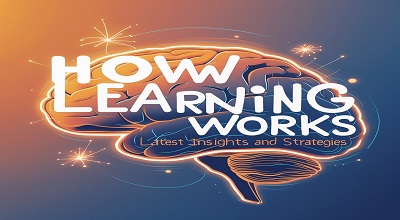How Learning Works?
How Learning Works: Learning is a complex, dynamic process that involves cognitive, emotional, and social factors. Whether you’re an educator, student, or lifelong learner, understanding how learning happens can enhance teaching methods and improve knowledge retention. In this comprehensive guide, we’ll explore the latest research, theories, and practical strategies to optimize learning.
Why Understanding Learning Matters?
Supports lifelong learning and professional development
Helps educators design better lesson plans
Empowers students to adopt effective study techniques
The Science of Learning
Cognitive Processes in Learning
Learning involves perception, attention, memory, and problem-solving. Cognitive psychology explains how the brain processes, stores, and retrieves information.
Memory and Retention
- Short-term vs. Long-term Memory – How information transitions from working memory to permanent storage.
- The Forgetting Curve – Ebbinghaus’s findings on memory decay and how to combat it.
Neuroplasticity and Brain Development
The brain’s ability to reorganize itself by forming new neural connections plays a crucial role in learning at all ages.
Theories of Learning
Behaviorism (Pavlov, Skinner)
- Learning through reinforcement and punishment.
- Applications in classroom management and skill training.
Constructivism (Piaget, Vygotsky)
- Learners construct knowledge through experiences.
- Importance of scaffolding and social interaction.
Social Learning Theory (Bandura)
- Observational learning and modeling behaviors.
Connectivism (Siemens)
- Learning in the digital age through networks and online resources.
Factors Influencing Learning
Motivation and Engagement
- Intrinsic vs. Extrinsic Motivation
- The role of curiosity and interest in learning
Emotional and Psychological Factors
- How stress and anxiety affect learning
- The impact of a growth mindset (Dweck)
Environmental and Social Influences
- Classroom design and learning spaces
- Peer collaboration and mentorship
Effective Learning Strategies
Active Learning Techniques
- Discussion-based learning
- Problem-solving and case studies
Spaced Repetition and Retrieval Practice
- Why cramming doesn’t work
- Tools like Anki and Quizlet for better retention
Metacognition and Self-Regulated Learning
- Teaching students to think about their thinking
- Setting goals and monitoring progress
Technology and Modern Learning
E-Learning and Digital Tools
- Benefits of online courses and MOOCs
- Best platforms for self-paced learning
Gamification in Education
- How game elements enhance engagement
- Examples: Duolingo, Kahoot!
AI and Personalized Learning
- Adaptive learning systems
- The future of AI tutors
Challenges in Learning
Learning Disabilities and Barriers
- Dyslexia, ADHD, and other challenges
- Inclusive teaching strategies
Overcoming Cognitive Overload
- Chunking information for better understanding
- Simplifying complex concepts
Adapting to Different Learning Styles
- Visual, Auditory, Reading/Writing, Kinesthetic (VARK Model)
- Multimodal teaching approaches
The Future of Learning
Emerging Trends in Education
- Microlearning and bite-sized education
- Virtual and augmented reality in classrooms
Lifelong Learning in the Digital Age
- The importance of continuous skill development
- Resources for adult learners
FAQs About How Learning Happens
1. What is the most effective way to learn?
Research suggests active learning, spaced repetition, and retrieval practice are among the most effective methods.
2. How does motivation affect learning?
Motivation drives engagement and persistence. Intrinsic motivation (personal interest) leads to deeper learning than extrinsic rewards.
3. Can technology replace traditional learning?
Technology enhances learning but doesn’t replace the need for human interaction, mentorship, and hands-on experiences.
4. How do learning disabilities impact education?
They require specialized teaching strategies, such as multisensory instruction for dyslexia or structured routines for ADHD.
5. What role does sleep play in learning?
Sleep consolidates memories and improves retention. Lack of sleep negatively affects focus and cognitive function.
Conclusion
Understanding how learning happens empowers educators and learners to adopt evidence-based strategies. By leveraging cognitive science, modern technology, and innovative teaching methods, we can create more effective and engaging learning experiences.
